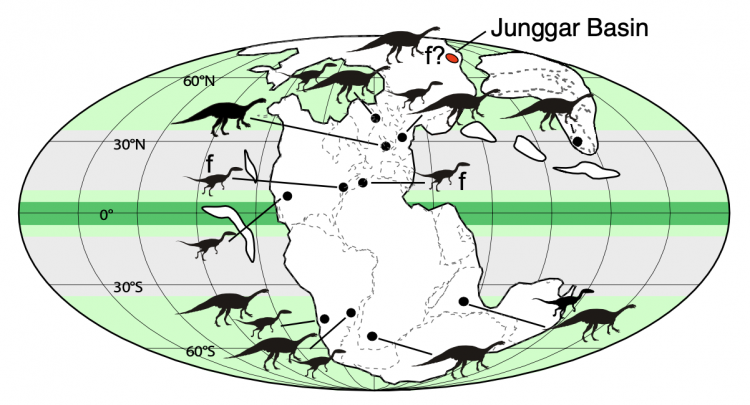Feathers May Have Been Key to Dinosaurs Taking Over Earth

By Ross Pomeroy
July 02, 2022
Early dinosaurs' surprising ability to tolerate freezing temperatures and long, harsh winters may have been what allowed them to dominate Earth's land environments after the end-Triassic extinction, a team of paleontologists posit in a new paper published to
Science Advances.
During the Triassic period between 200 and 250 million years ago, dinosaurs were still relatively small fry, second fiddle to huge, lumbering dicynodonts and large, crocodilian pseudosuchians, including ferocious predators like Saurosuchus. Their lesser status mostly relegated them to living in higher latitudes on Pangaea – the supercontinent that clumped much of the world's landmasses between 335 and 200 million years ago – while other animals dwelled in the lush tropics around the equator.

The approximate location of dinosaurs on Pangaea around 202 million years ago. Also shown: the location of Junggar Basin.
Olsen et al. / Science Advances
As Earth was then in a "greenhouse" state caused by extremely high atmospheric carbon dioxide levels, temperatures were very warm even in the Arctic and Antarctic regions. It has actually been debated whether or not these regions even experienced freezing temperatures at the time. Climate models suggest they did, but empirical evidence has been lacking. Lead Author Paul Olsen, the Arthur D. Storke Memorial Professor in Biology and Paleo Environment at Columbia University, and his colleagues provided that evidence in the new paper. They found fossilized lake ice-rafted debris, created by "seasonal ice that freezes along the shoreline, seizes grains in contact with the bottom, and then drifts out into open water when it breaks up and melts," in the Junggar Basin in modern-day Haojiagou, China. Dinosaur footprints were found in the same geologic layer, which was once situated in the high Arctic – solid evidence that dinosaurs lived in regions with freezing temperatures.
Olsen and his colleagues argue that rudimentary feathers helped dinosaurs thrive in these occasionally inhospitable areas, which insulated them from the cold. Pseudosuchians, however, lacked these fluffy, warm feathers – understandable given that they dwelled in the tropics. But this may have been their downfall when global disaster struck...
More:
https://www.realclearscience.com/articles/2022/07/02/feathers_may_have_been_key_to_dinosaurs_taking_over_earth_839758.html

